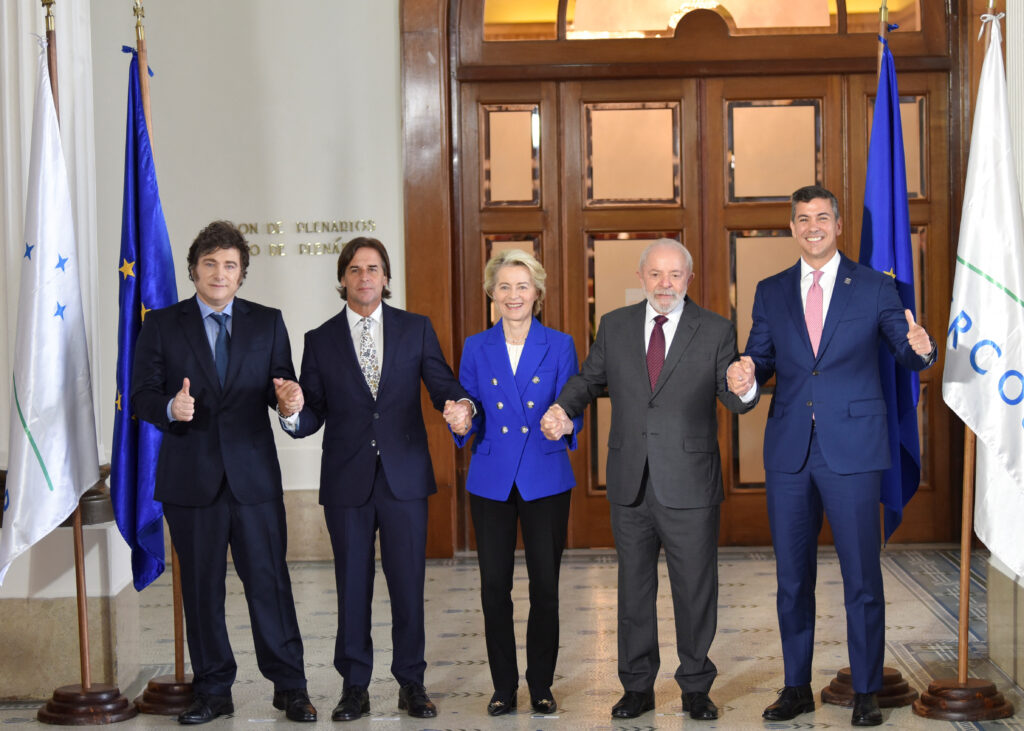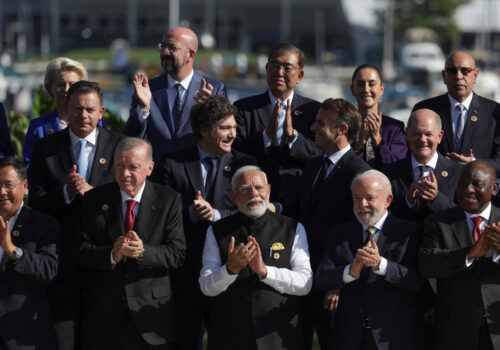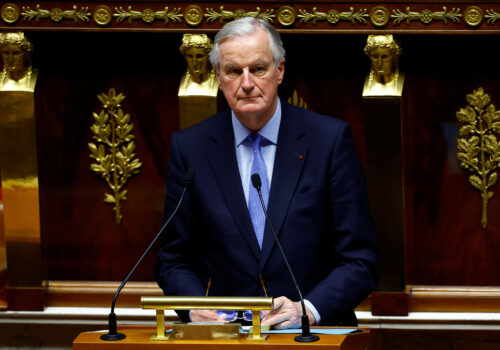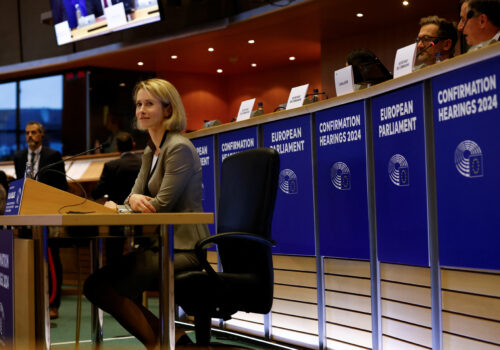It’s been decades in the making. On Friday, European Commission President Ursula von der Leyen announced that the European Union (EU) and Mercosur, the South American economic bloc comprising Argentina, Bolivia, Brazil, Paraguay, and Uruguay, had struck a major trade agreement. The deal, which would create a free trade area covering more than 780 million people, came over vocal opposition from France and still needs to be approved by a qualified majority of EU member states and by a majority in the European Parliament before it goes into effect.
What are the economic and political implications of this massive trade agreement? And what hurdles remain before it can be finalized and implemented? Our experts freely exchange their insights below.
1. Why is the deal moving forward now?
On the one hand, this agreement has been in process for a long time, so at some point, the EU just has to move forward, and a fresh start with a new European Commission is a good excuse and as good a time as any. On the other hand, it’s hard to ignore that the main opponent of the agreement, France, is in a weak position politically, as is Germany, and that the portfolio structure of the new Commission gives von der Leyen more power to advance her priorities. Therefore, there is likely an element of “striking while the iron is hot” to the timing of the agreement.
—L. Daniel Mullaney is a nonresident senior fellow with the Atlantic Council’s Europe Center and GeoEconomics Center. He served as assistant US trade representative for Europe and the Middle East in the Office of the United States Trade Representative from 2010 to 2023.
Both sides clearly felt the global circumstances made the deal even more important for their respective interests. From an EU perspective, it’s about having new destinations for EU exports if President-elect Donald Trump raises US tariffs and the Chinese economic slump continues. More broadly, it’s a win for the EU’s longstanding approach to economic security: instead of using economic coercion, the EU prefers to use the attractiveness of its single market to secure bilateral deals on market access. But this approach has become less and less fashionable, including in the EU, so von der Leyen felt the months ahead were the last chance to get a Mercosur deal ratified. But its passage is still far from certain.
—Charles Lichfield is the deputy director and C. Boyden Gray senior fellow of the Atlantic Council’s GeoEconomics Center.
The deal is moving forward now in large part because the negotiations have produced a text that most parties believe they can live with; the deal is “ripe,” so to say. But three other factors have been influential in why the deal is being signed right now:
- The most vocal opponent of the deal, French President Emmanuel Macron, has been politically wounded, perhaps mortally, by the collapse of Prime Minister Michel Barnier’s government, although it remains to be seen whether he can marshal a blocking minority in the European Council.
- Von der Leyen is in a strong political position, and she knows there will be opposition, so she might as well get this done early in her term. This also allows her to give a gift to the country she knows best—Germany—which looks to the Mercosur countries as a valuable market.
- The Commission is well aware that it needs to be seen as engaging with developing countries, and it needs to bring them on as economic and political partners, especially as relations with the United States could become difficult. If you see this as, in part, a signal to Trump, you are probably right.
—Frances Burwell is a distinguished fellow at the Atlantic Council’s Europe Center and a senior director at McLarty Associates.
The current geopolitical landscape—marked by rising global protectionism and economic uncertainties—has created momentum for finalizing the deal. Both blocs view this agreement as a strategic move to bolster economic ties and secure a stronger position in global trade.
—Abrão Neto is a nonresident fellow with the Atlantic Council’s Adrienne Arsht Latin America Center and a former secretary of foreign trade of Brazil.
2. What are the pros and cons for Mercosur members?
For Mercosur nations, the agreement unlocks significant access to the European market, a major importer of key Mercosur exports, such as food and critical minerals. It also positions these economies to attract greater investment, driven by the EU’s stringent criteria. On the other hand, the influx of European manufactured goods will challenge Mercosur industries to modernize, digitalize, and boost efficiency to stay competitive.
—Valentina Sader is a deputy director at the Atlantic Council’s Adrienne Arsht Latin America Center, where she leads the Center’s work on Brazil, gender equality, and diversity, and manages the Center’s Advisory Council.
The agreement improves market access for Mercosur exports, reduces costs for importing essential inputs and machinery, attracts foreign investment, and fosters economic growth and job creation. However, local industries might face heightened competition from EU manufacturers, and there is concern that EU-imposed environmental and sustainability standards could disproportionately affect Mercosur producers, potentially offsetting some benefits.
—Abrão Neto
3. What are the pros and cons for the EU and EU member states?
Improving trade integration with a significant part of the Western Hemisphere will be a useful diversification of the EU trade portfolio, as US-China and US-EU trade relations shift to a potentially more disruptive period with the incoming US administration. The other side of the coin is that providing agricultural market access to Mercosur has been very controversial, particularly in France (whose government is weakened, perhaps only temporarily, by political challenges from the left and the right). Some of the “sustainability” practices in Mercosur countries have also drawn controversy. So while this may be a wise economic choice, it could trigger significant political backlash.
—L. Daniel Mullaney
The pros are clear. In addition to better market access terms to Latin America for EU goods, the bloc hopes to access the critical minerals available in the ground in Mercosur countries and stymie China’s increasing influence in that sector.
The cons are supposedly a glut of cheap Argentine beef and Brazilian bananas. But there are tough quotas in the deal, including a limit equivalent to one Mercosur steak per EU citizen per year. So European farmers’ objections are not entirely justified, although the complaint that they have to follow more constraints (on emissions and the use of fertilizer and pesticides) than Mercosur farmers do is probably more reasonable.
—Charles Lichfield
This agreement has the potential to bring serious economic benefits to the EU in terms of new markets. In 2023, the EU had a slight trade surplus vis-à-vis Mercosur, and certain European countries had a significant surplus. Germany’s surplus was nine billion euros, Belgium’s was three billion euros, and even France had a two-billion-euro surplus. These countries are all in a position to benefit from the Mercosur arrangement. But in every trade deal, there are winners and losers, and clearly some of the losers in France, especially the farmers, are very powerful politically. It is also true that critics of Mercosur have ignored some of the provisions in the deal that answer their concerns, such as a ban on imports of hormone-fed beef.
In this partisan environment, the economic advantages of the deal may be cancelled out by the political disadvantages. The signature today will only exacerbate the anger of those in Europe who believe the Commission acts in its own interests and fails to protect the interests of European citizens. While the German government and mainstream parties may support the EU-Mercosur arrangement, there are many in that country who feel left out economically and who are likely to see this as another reason to vote for a Euroskeptic party. Thus, while the agreement brings many economic benefits, these might be outweighed by the political costs.
—Frances Burwell
4. What do the next steps look like for the deal?
The process involves legal scrubbing, translation into multiple languages, formal signing, and ratification by national parliaments in both blocs. While this agreement represents a historic milestone, significant political and stakeholder debates are anticipated, presenting challenges before full implementation.
—Abrão Neto
In the EU, the next steps are a likely challenging process of approval from the member states and consent by the European Parliament. The debate over the positive and negative aspects of this initiative will play out very publicly among relatively new actors in the EU institutions and member states. In the meantime, France’s and Germany’s political challenges may or may not endure. Fasten your seat belts and pass the popcorn!
—L. Daniel Mullaney
Further reading
Tue, Nov 19, 2024
How Brazil, Mexico, and Argentina approached this year’s G20
New Atlanticist By
Disparate national priorities among Latin America’s three G20 members threaten to stand in the way of a common agenda.
Thu, Dec 5, 2024
Experts react: France’s government lost a no-confidence vote. What’s next?
New Atlanticist By
Our experts share their insights on the collapse of the French government after Prime Minister Michel Barnier lost a no-confidence vote.
Tue, Nov 12, 2024
What the European Parliament hearings are revealing about the next European Commission
New Atlanticist By
As all twenty-six European commissioners-designate appear before the European Parliament, Atlantic Council experts dig into their hearings for clues about the future of the European Union.
Image: Uruguay's President Luis Lacalle Pou poses with European Commission President Ursula von der Leyen, Argentina's President Javier Milei, Brazil's President Luiz Inacio Lula da Silva, Paraguay's President Santiago Pena during a family photo at the Mercosur Summit in Montevideo, Uruguay December 6, 2024. REUTERS/Martin Varela Umpierrez.



